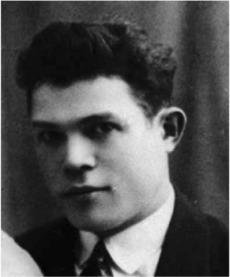Photo from the collection of: U.S. Holocaust Memorial Museum, courtesy of David Gelbart
Simon Gelbart
Born: March 15, 1908, Warta, Poland
Simon Gelbart learned to survive against the odds from an early age. The youngest of 13 children, his father died when he was only seven years old, and his mother died soon after that. When his aunts and uncles refused to care for him, Simon was left a homeless orphan. He lived on the streets until he was 15. Then he became an apprentice to Zisha Nitka, a shoemaker who lived in Kalisz. He became an expert shoemaker and eventually married Zisha's daughter, Sura Rivka.
Simon and Sura had two sons, Israel David and Haim. After the start of World War II, the Jews of Kalisz were forced to move. Simon packed up his shoemaker's tools and hid coins in the heels of their shoes. They were deported to a Siberian Labor camp. Although Simon was frail and unhealthy, he was assigned to chop and haul lumber. On the first day, he failed to meet his quota and was sent to prison for six months.
In 1942, the family was sent to a collective farm near the Volga River. Haim died from starvation. He was seven years old. Israel David survived because of the generosity of a Russian woman, Pashinka Bravina. She took the boy into her home and fed him bread and milk for eighteen months. They were allowed to return to Poland in 1946, but fled to West Germany because of the danger of anti-Semitism. Simon dreamed of moving to Israel and setting up a shoemaking factory. He was denied a visa, and so instead the family moved to Omaha, Nebraska, in 1951.


